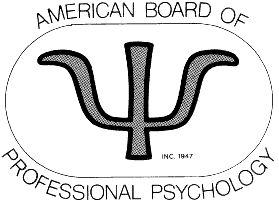What it means when your Psychologist is Board Certified by the American Board of Professional Psychology (ABPP).Like all lawfully practicing psychologists in Pennsylvania, your VPG/RETIRN psychologists are licensed by the state (the Commonwealth of Pennsylvania). But in addition to basic licensure, Dr. Steve K. D. Eichel has taken the extra step of becoming Board Certified by the American Board of Professional Psychology. He has therefore earned the designation of Diplomate in Counseling Psychology, and the right to use the initials "ABPP" and "FAACoP" (Fellow of the American Academy of Counseling Psychology) after his name and degree.
To become Board Certified, Dr. Eichel first had to meet stringent eligibility criteria, which included appropriate doctoral-level education and a minimum of at least two years of supervised practice in the specialty. Next, he had to submit written and videotaped work samples for peer review. Upon acceptance, the next and final step involved taking and passing an examination administered by the specialty board. To pass this examination, Dr. Eichel had to demonstrate that he can practice the specialty of counseling psychology at an advanced level of competency.
The American Board of Professional Psychology was established with the cooperation of the the American Psychological Association as the premier credentialing agency for psychology practitioners. Since 1947, it has been dedicated to promoting the highest standards of professional training and ethics for those engaged in the delivery of psychological services. Board Certification is considered by the American Psychological Association to be the highest credential that can be earned by a professional psychologist. By seeking and obtaining the ABPP Diploma, Dr. Eichel has taken this voluntary step to assure clients of a commitment to the highest standard of care.
The format of the examination usually involves a "professional conversation" based upon the candidate's work samples; fundamental knowledge expected in the specialty; situational content representative of the specialty; and professional issues/ethical problem solving capacity of the candidate.
Diplomates in the specialty of counseling psychology have been recognized as pioneers and leaders in the delivery of clinical services in mental health, and, in vocational and life skills development and counseling, as well as in research. The Academy of Counseling Psychology looks to further ABPP's tradition of leadership in the examination and recognition of excellence in the practice of counseling psychology and the specialty's continuing development as a force within the psychology profession.

What it means when your Clinical Social Worker is Board Certified by the American Board of Examiners in Clinical Social Work.
The Board Certified Diplomate in Clinical Social Work (BCD) is a credential emblematic of advanced practice competency and issued by ABE to those who have achieved high levels of specified clinical education, training, and experience. The following are required for BCD status (summarized):
- Five years and 7,500 hours of direct clinical practice (including 3,000 hours of supervised clinical practice)
- A master's degree in social work with specified clinical course content from a program accredited by the Council on Social Work Education
- The highest license or certification in the jurisdiction(s) where practice occurs
- Successful completion of the BCD examination process.
Board Certified Diplomate clinicians are re-certified annually on the basis of primary-source verification of state licensure/certification in good standing, a minimum of 20 hours of continuing clinical education, and currency of practice based on 3,000 hours during the past ten years.
What is the Importance of Proficiency Certifications?
In addition to being licensed by the state, VPG/RETIRN staff are certified to deliver a variety of specific services. Why is this important? What is the purpose of obtaining certifications?
Certification is your guarantee that your therapists have had their expertise reviewed and evaluated by a panel of peer experts, and that they have been judged as having fulfilled the requirements necessary to practice in a specific area of psychology, psychotherapy or counseling. This does not mean that a therapist who is not certified in a particular area is not competent to deliver a specific service. Certification is a voluntary process; it is generally not a requirement to practice a particular skill. What certification provides is an objective verification of a professional's claim to have specific skills
Most certifications are time-limited, and must be renewed periodically. To renew a certification, your therapist usually has to fulfill continuing education requirements in that specialty area. Therefore, in addition to initially verifying a therapist's skill, certification is your guarantee that your therapist is remaining up-to-date in his/her specialty area by obtaining ongoing training and education.
VPG/RETIRN staff are certified in several areas. These include:
|
|
|